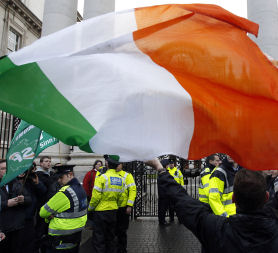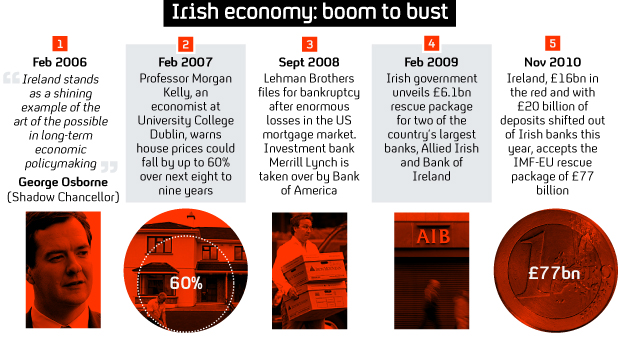George Osborne: Ireland bailout in UK’s interest
As Chancellor George Osborne tells MPs it’s in Britain’s interest to take part in the Irish bailout, the Irish Premier promises an election in the New Year.

Mr Osborne told the Commons: “The United Kingdom, alongside the International Monetary Fund, the European Union, the eurozone and other member states is participating in the international financial assistance package for Ireland announced last night.
He said it was “overwhelmingly in Britain’s national interest” for Ireland to have a stable economy. The country was a major trading partner with an “interconnected” banking system with the UK.
Our Political Editor, Gary Gibbon, says the total amount of British support across three separate loan packages could reach £9billion – although most of this would be required only should Ireland default.
“There will be a time for accountability to the electorate.” Irish Premier Brian Cowen
In Dublin, the Taoiseach, Brian Cowen, announced tonight that his Coalition Government would introduce its four-year plan to restore financial stability next Wednesday, followed by a new Budget on 7 December, implementing savings of six billion euros in the coming year.
“It is my intention at the conclusion of this budgetary process – with the enactment of the necessary legislation in the New Year – to then seek the dissolution of the Dail Eireann and enable the people to determine who should undertake the responsibility of government in the challenging period ahead thereafter,” he said.
He insisted that it would not be in the interests of the Irish people to call an election before the bailout was agreed and the cuts introduced. “There will be a time for accountability to the electorate,” he added.
Who Knows Who: Ireland's financial friends and bailout buddies
Osborne’s statement
In the Commons, Mr Osborne defended British involvement in the bailout.
“We are doing this because it is overwhelmingly in Britain’s national interest that we have a stable Irish economy and banking system,” he said.
“The current Irish situation has become unsustainable. Their sovereign debt markets had effectively closed and had little prospect of reopening.”
Mr Osborne also revealed that talks had been going on between the G7, the IMF and the European Union before Ireland officially asked for the bailout.
Labour’s Shadow Chancellor Alan Johnson said his party was “in principle content to support a role for the UK in assisting Ireland to secure economic stability”.
Britain's part of the Ireland loan bill
Political Editor Gary Gibbon writes: "George Osborne has been explaining to the Commons that the IMF will be expected to put up one third of the loans needed by Ireland, the EU would put up two thirds.
"That could, I emphasise could, mean the UK contributes around £3/4bn under the EU mechanism, £2bn through the IMF and perhaps more than £2bn through bi-lateral support. It could easily be nudged higher, sources talk of the total UK liability coming to £7, £8 or £9bn."
Read more: Gary Gibbon's blog
The Chancellor’s statement comes as Ireland officials negotiate the rescue deal. But the Irish government was thrown further into chaos, with the country’s Green Party, who are junior partners in its coalition government, calling for a General Election in January – though Mr Cowen tonight denied that he was bowing to their pressure.
Two other TDs have also said that the government could not rely on their support to pass the 2011 Budget if swingeing cutbacks were unveiled, so the Government could still fall before its gets its measures through.
Ireland’s coalition government, which includes Fianna Fail, the Greens and independent politicians, has a very slim majority in parliament.
“The past week has been a traumatic one for the Irish electorate. People feel misled and betrayed,” Green Party leader and Environment Minister John Gormley said.
“But we have now reached a point where the Irish people need political certainty to take them beyond the coming two months. So we believe it is time to fix a date for a general election in the second half of January 2011.”

Economics Correspondent Faisal Islam, who is in Dublin, said Mr Cowen was “the lamest of lame ducks you could imagine”, while the package had failed to completely satisfy the markets.
The European Union and the International Monetary Fund agreed a three-year bailout package for Ireland after the country asked for financial aid yesterday.
It is expected to receive loans totalling 80 to 90 billion euros, with the UK and Sweden also offering direct loans.